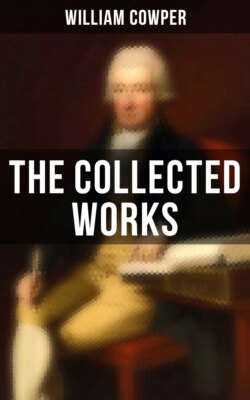Читать книгу The Collected Works - William Cowper - Страница 233
На сайте Литреса книга снята с продажи.
TO THE REV. WILLIAM UNWIN.
ОглавлениеTable of Contents
Olney, Sept. 7, 1783.
My dear Friend—So long a silence needs an apology. I have been hindered by a three-weeks' visit from our Hoxton friends,[193] and by a cold and feverish complaint which are but just removed.
The French poetess is certainly chargeable with the fault you mention, though I thought it not so glaring in the piece I sent you. I have endeavoured indeed, in all the translations I have made, to cure her of that evil, either by the suppression of passages exceptionable upon that account, or by a more sober and respectful manner of expression. Still, however, she will be found to have conversed familiarly with God, but I hope not fulsomely, nor so as to give reasonable disgust to a religious reader. That God should deal familiarly with man, or, which is the same thing, that he should permit man to deal familiarly with him, seems not very difficult to conceive, or presumptuous to suppose, when some things are taken into consideration. Woe to the sinner, that shall dare to take a liberty with him that is not warranted by his word, or to which he himself has not encouraged him. When he assumed man's nature, he revealed himself as the friend of man, as the brother of every soul that loves him. He conversed freely with man while he was on earth, and as freely with him after his resurrection. I doubt not, therefore, that it is possible to enjoy an access to him even now, unincumbered with ceremonious awe, easy, delightful, and without constraint. This, however, can only be the lot of those who make it the business of their lives to please him, and to cultivate communion with him. And then I presume there can be no danger of offence, because such a habit of the soul is of his own creation, and, near as we come, we come no nearer to him than he is pleased to draw us. If we address him as children, it is because he tells us he is our father. If we unbosom ourselves to him as to a friend, it is because he calls us friends, and if we speak to him in the language of love, it is because he first used it, thereby teaching us that it is the language he delights to hear from his people. But I confess that, through the weakness, the folly, and corruption of human nature, this privilege, like all other Christian privileges, is liable to abuse. There is a mixture of evil in every thing we do; indulgence encourages us to encroach; and, while we exercise the rights of children, we become childish. Here I think is the point in which my authoress failed, and here it is that I have particularly guarded my translation, not afraid of representing her as dealing with God familiarly, but foolishly, irreverently, and without due attention to his majesty, of which she is somewhat guilty. A wonderful fault for such a woman to fall into, who spent her life in the contemplation of his glory, who seems to have been alway impressed with a sense of it, and sometimes quite absorbed by the views she had of it.
W. C.
